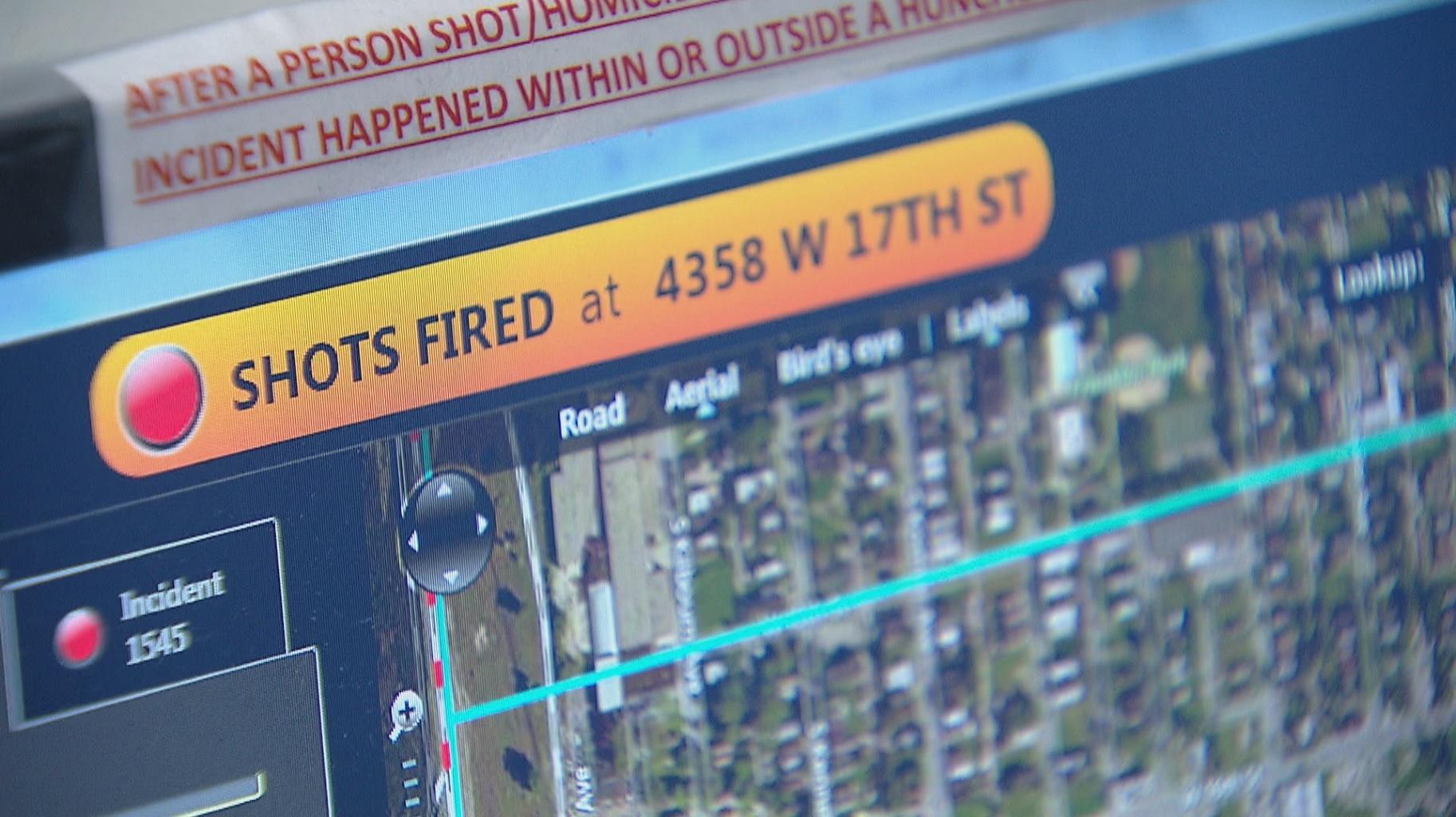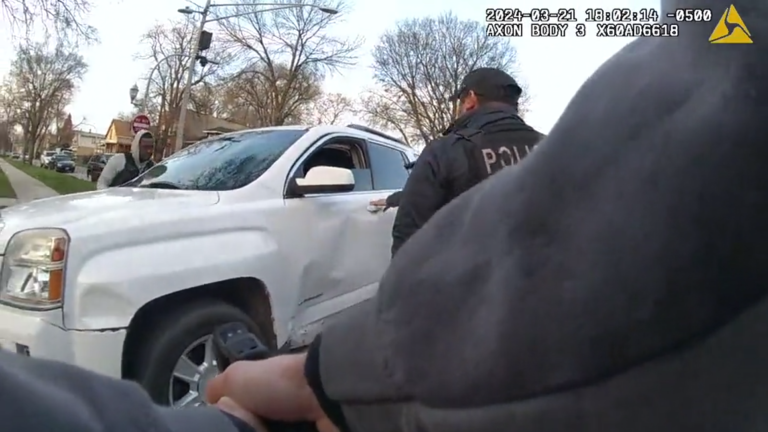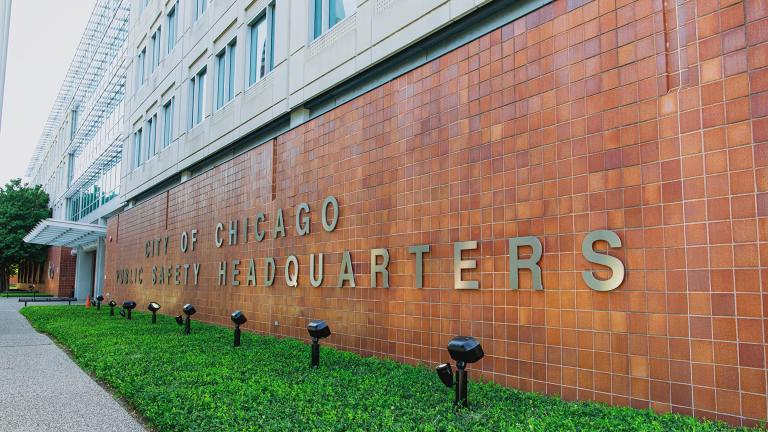 (WTTW News)
(WTTW News)
With only days remaining in Chicago’s expiring ShotSpotter contract, community activists, elected officials and Chicago residents gathered Thursday to express their confidence and concerns with the controversial technology.
The Community Commission for Public Safety and Accountability (CCPSA) held a community discussion at St. Sabina Church Thursday evening to hear the community’s thoughts on the city's ShotSpotter contract.
The meeting was largely calm, but tensions boiled over as it drew to a close as attendees began shouting at each other and toward the commission.
“This issue is not as binary as you are making it,” CCPSA President Anthony Driver told the crowd. “For people who have a ton of privilege — and that’s what I have been seeing for the past year — to dictate to communities that live under gun violence every day how they are supposed to feel. Be respectful … that is not OK.”
The current contract with SoundThinking — which was previously known as ShotSpotter — expires Feb. 16. Mayor Brandon Johnson made a campaign promise to end the contract, but has not yet indicated whether he’ll renew the deal.
While the CCPSA organized Thursday’s meeting, President Anthony Driver made clear that the commission has no power over whether the city renews its ShotSpotter contract and said commission members do not yet know what Johnson’s decision will be.
Chicago first entered into a contract with ShotSpotter in 2017, and that deal has been extended twice since then. The technology relies on microphones and sensors to identify the sound of gunfire and alert law enforcement so they can more quickly respond to the scene.
Those calling for the city to end its contract have described ShotSpotter as inefficient and dangerous, saying it fails to help stop violence before it happens.
“The problem is ShotSpotter is reactive, not preventative,” community organizer Asia Smith said Thursday evening. “It can only respond, not prevent.”
In a statement, Saqib Bhatti, co-director of the Action Center on Race and the Economy, called ShotSpotter “an insidious product” that he said “preys on Black and brown communities’ well-founded fear of gun violence to extract a profit without making communities safer.”
Many who argued on behalf of canceling the contract pointed to the fatal shooting of 13-year-old Adam Toledo by a Chicago police officer responding to a ShotSpotter alert in March 2021.
Toledo was carrying a firearm in his right hand as he was chased by Officer Eric Stillman, but began dropping the gun and tried to put his arms in the air as he turned to face Stillman, who then fired one shot at the boy, striking him in the chest, according to video captured by Stillman’s body-worn camera.
“Is the cost of another dead kid acceptable,” freelance journalist Raven Geary asked during public comment Thursday.
But those who see value in ShotSpotter said any tool that can get emergency responders to the scene of a shooting is a necessary aid.
“I don’t understand how we can quantify a person’s life,” said Remis Herrera, who said her brother, Salvador, was fatally shot last October. “Put yourself into a place as a law-abiding citizen and you become a victim of gun violence and no one comes to your rescue, no one comes to your aid. I want you to quantify the value of that and let you know how much is your life worth, how much is your family member’s life worth? This is a life-saving technology.”
Johnson’s handpicked police superintendent, Larry Snelling, has voiced his support for ShotSpotter, denying that it’s a “tool of surveillance” as critics have labeled it, while claiming it gives officers a leg up in responding to violent crimes.
Former top cop Eddie Johnson has also defended the technology, saying he found ShotSpotter “very useful” and pointing to shooting reductions in some of the city’s most violent areas within six months of its implementation.
“I appreciate the idea that we want to reinvest in our communities,” ShotSpotter President and CEO Ralph Clark said during Thursday’s meeting. “For me, it’s all hands on deck. You need everything you possibly can gather up resource-wise to solve this particular problem. It’s not either/or. It’s and — and, and, and.”
But ShotSpotter alerts have had a small impact on the number of gun crimes actually prosecuted by the Cook County State’s Attorney’s Office in recent years, according to an internal document obtained by Chicago Sun-Times.
From August 2018 to August 2023, a total of 160,400 ShotSpotter alerts led to just 2,543 arrests, the Sun-Times reported. The document concluded that “ShotSpotter is not making a significant impact on shooting incidents.”
According to the report, only 1% of shooting incidents end in a ShotSpotter-related arrest.
“A stopped clock is right twice a day,” community organizer Nathan Palmer said Thursday. “We’re here because we want to figure out solutions for gun violence that not only address root causes, but that are able to respond on a block-by-block basis to this type of horrible violence.”
Heather Cherone contributed to this report.
A Safer City is supported, in part, by the Sue Ling Gin Foundation Initiative for Reducing Violence in Chicago.








